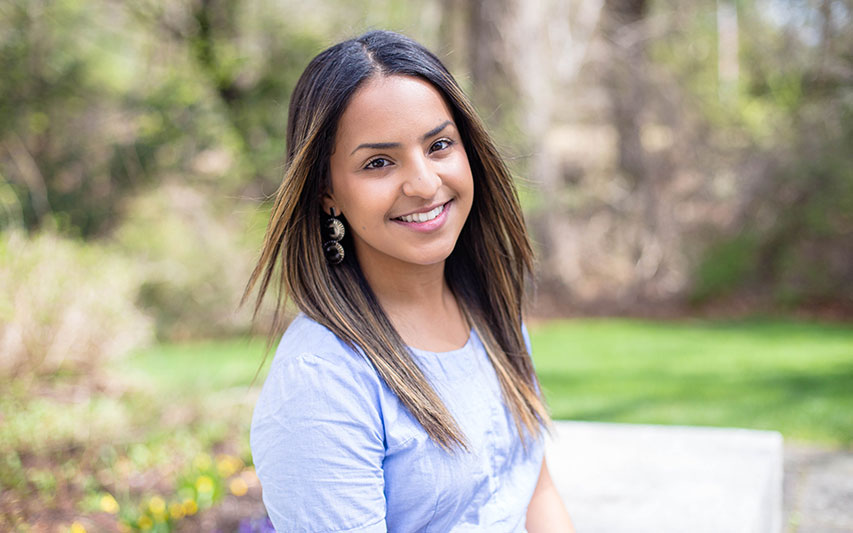
TOPICS:
A few days before the Thanksgiving break, former Education major and current East Boston teacher Solanyel Perez ’19 returned (virtually) to the Curry community to facilitate a challenging and honest conversation with education students on racism and bias in today’s K-12 classrooms.
“The questions we received from the students were meaningful and deep, and they were not easy questions to ask,” she says of the panel talk she organized with fellow Boston Teacher Residency (BTR) alumni. The group discussed culturally responsive teaching with the Senior Capstone class and shared their experiences teaching in the Boston Public Schools district. The event was an exciting beginning for a new collaboration between the young alumna and the Education program at the College, which moving forward, aims to integrate ongoing campus-wide and department reading groups, learning communities, guest speakers, and workshops on anti-racist teaching practices and policies.
“I feel that Curry equipped me with effective strategies to provide students with enjoyable and interactive lessons,” says Perez. “Those learned methods coupled with information about the disparity of education between socioeconomic classes and the interplay of race will solidify the teacher tool-belts that are being constructed at Curry. As an alum, I hope to add to the strength of the education program.”
Professional development readings among Education faculty at the College have included “It’s Not About You, It’s About Us: A Black Woman Administrator’s Efforts to Disrupt White Fragility in an Urban School,” and “The Dialogue of Denial: Perpetuating Racism Through Thoughtful Inaction.” The department has also started to embed relevant readings regarding racial inequities and gender fluidity in many foundational education courses. Last month, Dr. Kathy McDonough’s Children’s Literature: Gateway to the World course explored immigration literature by featuring I’m Your Neighbor Books co-founder Kirsten Cappy and Dr. Elsa White, of Boston University’s Africa Studies program, as guest speakers.
White, female educators continue to make up most of the U.S. teaching force. Dr. McDonough says it’s critical for education programs to support expanded training, education, and awareness for future teachers. “Education is often seen as the great equalizer, yet, because of many inequities in our education system, it’s not always the case,” she says. “We must make a shift in how we understand ourselves and our work as educators. It’s about providing better education to students of color and educating preservice teachers how to teach with the goal of racial equity."
While studying at Curry, Perez worked closely with the Education faculty to focus her coursework and training in Elementary Education. She completed two practicums – one in a first-grade classroom in the Boston Public Schools and the other in a fourth-grade classroom in Milton Public Schools. With support from Curry’s Study Abroad Program, Perez arranged to spend a semester studying in Brazil to become proficient in Portuguese and add multilingual expertise to her teaching. During her years at the College, she also served as a tutor for Scholar-Athletes, a program that supports academic achievement through athletics and provided her with a scholarship to Curry. Today, she teaches Spanish Language Arts and Science to third and fourth graders at the Mario Umana Academy in East Boston, where she attended as a child.
“I gained so much from Curry, and I’m excited to again work with and learn from Dr. Joanne Seltzer and Dr. McDonough, who are great mentors to me,” she says. More than anything, Perez feels passionate about creating new spaces for those difficult dialogues and hopes to see future educators from Curry think critically about their individual experiences and biases that impact their ability as effective teachers. “It all begins with self-reflection. The way to change the dynamic is to teach education students to understand their reality and social location, and I’m happy to be a thought partner to help create more space to do just that at Curry.”